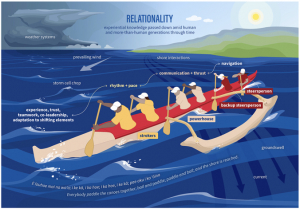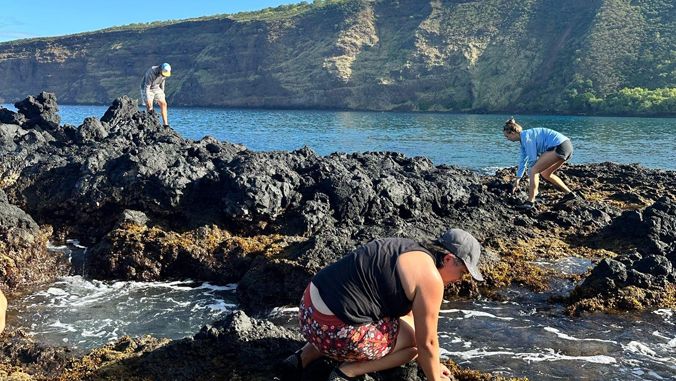Long-term relationships built on a foundation of trust between communities, researchers and the natural world can transform science, education and climate adaptation. That is the central message of a study published in Emotion, Space and Society by Scott Laursen, a climate adaptation extension specialist with the University of Hawaiʻi at Mānoa Pacific Islands Climate Adaptation Science Center (PI-CASC).
The article, co-led by long-term Kealakekua residents, cultural practitioners and lineal descendants, showcases a decade of community-driven work on Hawaiʻi Island and its connection to multiple UH Hilo projects.
‘Speed of trust’
“When science is co-led by communities rooted in place and guided by respect for human and more-than-human relationships, communities and science innovate rapidly; they drive effective actions, and create lasting solutions,” said Laursen. “Moving at the ‘speed of trust’ has been fundamental to the human condition since the dawn of time. Locating and empowering long-term, place-based networks offers a powerful way forward in a rapidly changing world.”
The research focuses on how “relational worldviews”—where people, places and ecosystems are seen as deeply interconnected—are shaping new and effective approaches to climate adaptation. From coral restoration in Kapukapu to rethinking shoreline management on Hawaiʻi Island, the article demonstrates how sustained collaboration addresses urgent local challenges while training the next generation of scientists and resource stewards.
The publication emphasizes:
- Immersing the scientific method within place-based pathways to drive real-world impact through applied science.
- Highlighting the value of building and maintaining long-term relationships between community and research networks.
- Stressing the importance of storytelling and narratives for general audiences in academic literature.
- Presenting hoe waʻa (traditional outrigger canoe paddling) as a metaphor for uniting diverse forms of knowledge (e.g., emotion, instinct, cultural norms, rational intellect).
Paddling together

The article uses the metaphor of hoe waʻa to illustrate how collaboration functions. Just as a canoe crew must trust each other and stay attuned to changing ocean conditions to navigate successfully, research partnerships require skill, humility, flexibility and an awareness of their surroundings.
Co-author Akoni Palacat-Nelsen, executive director of Hoʻāla Kealakekua Nui and Kapukapu ʻOhana co-founder, connected this approach to on-the-ground action.
“Climate adaptation is a global initiative. Hoʻāla Kealakekua Nui redirected its resources to address climate adaptation by implementing traditional ecological knowledge,” said Palacat-Nelsen. “It is critical to first re-establish the broken relationship between humans and the impacted resource(s), such that we transcend notions of ‘resources’ and instead engage such arenas as the ‘source’ of life. Place-based traditional knowledge employs methods like kilokilo (community-driven data collection), as seen in our Kanu Koʻa project, which focuses on rebuilding resilient coral communities and restoring the habitat for ʻopae ʻula (shrimp) in our anchialine pools at Kealakekua Bay. The practice of kilokilo reinforces trust in the long-term relationship between humans and the more-than-human experiences.”
Other co-authors include artists, NOAA and National Park Service employees, a policy professional, UH Hilo geography and environmental science professor Ryan Perroy, recent UH Hilo graduate students Aloha Kapono and Rose Hart, and PI-CASC’s Executive Director Darren Lerner.
